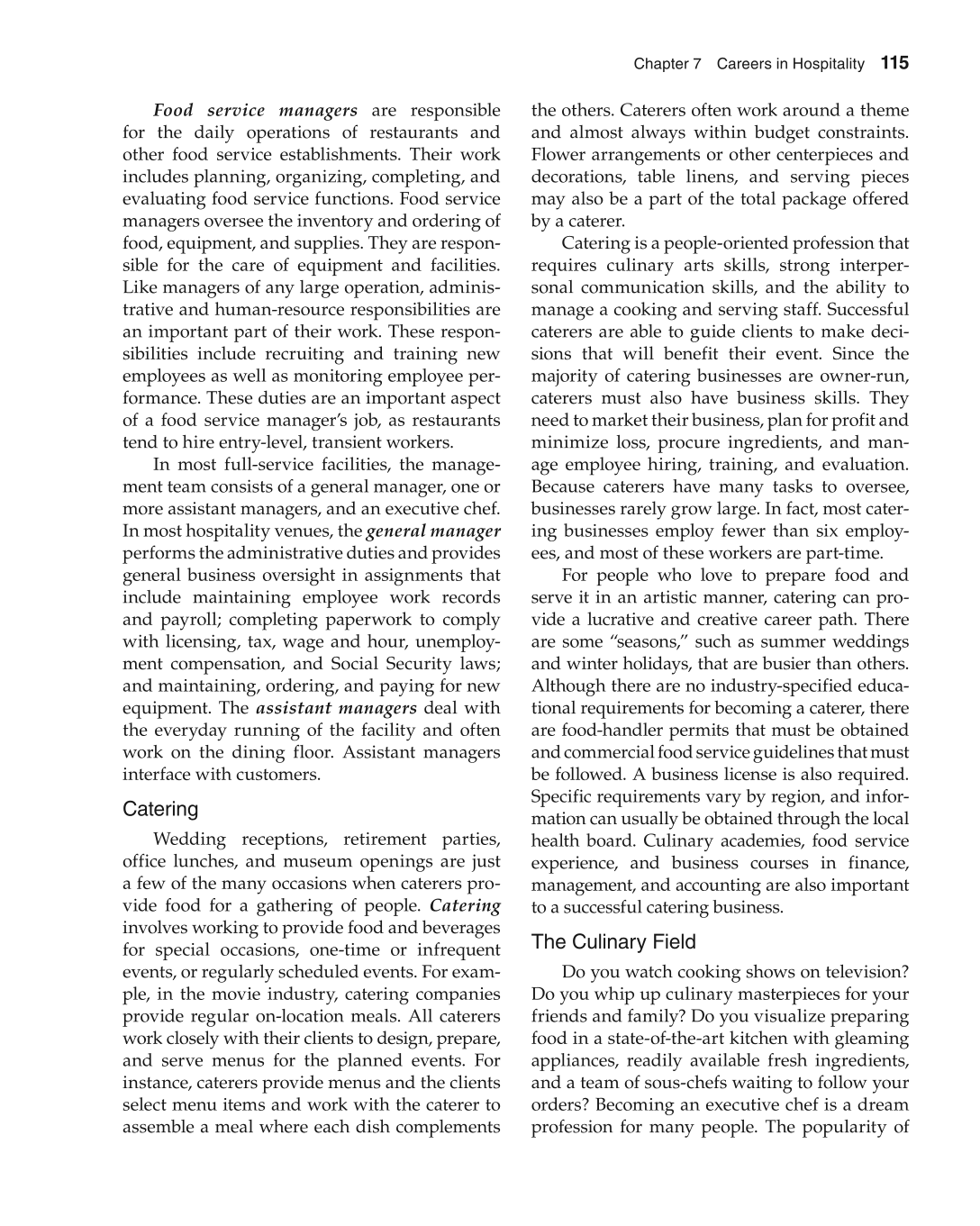Chapter 7 Careers in Hospitality
115
Food service managers are responsible
for the daily operations of restaurants and
other food service establishments. Their work
includes planning, organizing, completing, and
evaluating food service functions. Food service
managers oversee the inventory and ordering of
food, equipment, and supplies. They are respon-
sible for the care of equipment and facilities.
Like managers of any large operation, adminis-
trative and human-resource responsibilities are
an important part of their work. These respon-
sibilities include recruiting and training new
employees as well as monitoring employee per-
formance. These duties are an important aspect
of a food service manager’s job, as restaurants
tend to hire entry-level, transient workers.
In most full-service facilities, the manage-
ment team consists of a general manager, one or
more assistant managers, and an executive chef.
In most hospitality venues, the general manager
performs the administrative duties and provides
general business oversight in assignments that
include maintaining employee work records
and payroll; completing paperwork to comply
with licensing, tax, wage and hour, unemploy-
ment compensation, and Social Security laws;
and maintaining, ordering, and paying for new
equipment. The assistant managers deal with
the everyday running of the facility and often
work on the dining floor. Assistant managers
interface with customers.
Catering
Wedding receptions, retirement parties,
office lunches, and museum openings are just
a few of the many occasions when caterers pro-
vide food for a gathering of people. Catering
involves working to provide food and beverages
for special occasions, one-time or infrequent
events, or regularly scheduled events. For exam-
ple, in the movie industry, catering companies
provide regular on-location meals. All caterers
work closely with their clients to design, prepare,
and serve menus for the planned events. For
instance, caterers provide menus and the clients
select menu items and work with the caterer to
assemble a meal where each dish complements
the others. Caterers often work around a theme
and almost always within budget constraints.
Flower arrangements or other centerpieces and
decorations, table linens, and serving pieces
may also be a part of the total package offered
by a caterer.
Catering is a people-oriented profession that
requires culinary arts skills, strong interper-
sonal communication skills, and the ability to
manage a cooking and serving staff. Successful
caterers are able to guide clients to make deci-
sions that will benefit their event. Since the
majority of catering businesses are owner-run,
caterers must also have business skills. They
need to market their business, plan for profit and
minimize loss, procure ingredients, and man-
age employee hiring, training, and evaluation.
Because caterers have many tasks to oversee,
businesses rarely grow large. In fact, most cater-
ing businesses employ fewer than six employ-
ees, and most of these workers are part-time.
For people who love to prepare food and
serve it in an artistic manner, catering can pro-
vide a lucrative and creative career path. There
are some “seasons,” such as summer weddings
and winter holidays, that are busier than others.
Although there are no industry-specified educa-
tional requirements for becoming a caterer, there
are food-handler permits that must be obtained
and commercial food service guidelines that must
be followed. A business license is also required.
Specific requirements vary by region, and infor-
mation can usually be obtained through the local
health board. Culinary academies, food service
experience, and business courses in finance,
management, and accounting are also important
to a successful catering business.
The Culinary Field
Do you watch cooking shows on television?
Do you whip up culinary masterpieces for your
friends and family? Do you visualize preparing
food in a state-of-the-art kitchen with gleaming
appliances, readily available fresh ingredients,
and a team of sous-chefs waiting to follow your
orders? Becoming an executive chef is a dream
profession for many people. The popularity of
